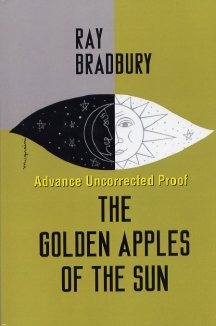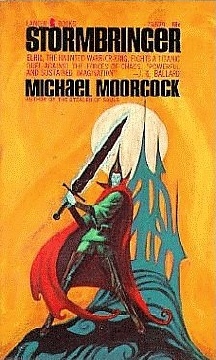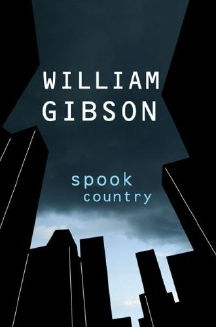|
|
|
|
This Just In...News
From The Agony Column
|
|
08-19-07: Preview for Podcast of Monday, August 20, 2007 : These disconnects have always been with us.
Here's an MP3
preview of the Monday August 20, 2007 podcast for The Agony
Column. Enjoy!
|
| |
|
08-17-07: Nathalie Mallet Unlocks 'The Princes of the Golden Cage'
|
Night Shade Books' First Mass Market Paperback
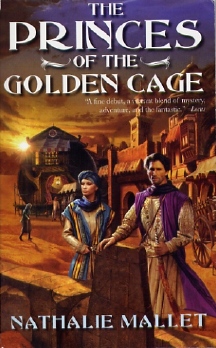 |
|
| Look
out New York. |
'The Princes of the
Golden Cage' (Night Shade Books ; August 15, 2007 ; $7.99) by Nathalie
Mallet may be a small
book – it's a mass market paperback – but
that's big news. I've been following the small press for more than twenty
years, and I've never seen any small press publisher do what Night Shade
has just done. They've just published a mass market paperback. It's a
fascinating direction for Night Shade, and it suggests that the publishing
world may not be as moribund as so many insist. Here's a perfect David
versus Goliath story come to life.
The small press generally thrives by doing what the big New York publishers
don’t do; Golden Gryphon mostly publishes single-author collections,
for example, and Hill House specializes in super-ultra deluxe editions
of big-ticket, well-established writers. Night Shade has done a bit of
both, but they've also done something that many small presses have not
done. They’ve kept the costs of their trade hardcover originals competitive
with the New York gang, generally bringing them in at $25. They’ve
actually competed with New York on NY's own terms and managed to prosper
enough to take the competition to a new level, the mass market paperback.
They're doing both their authors and their customers a huge favor. With
books like 'The Princes of the Golden Cage', they’re giving authors
who might otherwise have been missed by the NY machine a chance. They're
also offering their customers the fruits of their finely-honed sensibilities
at a rock-bottom price. This is a BIG DEAL.
Of course it helps if the books themselves are actually good. And here
is where the intrepid readers shall actually have to read in order to get
it, because 'The Princes of the Golden Cage' looks – in every sense – like
any other book you might see out of New York. You have a Paul Youll cover.
You have a novel that is apparently a fantasy with a bit of romance thrown
in, sussing from what you read on the back. The fantasy fan looking for
a little jolt of fun could easily pick this one up without exercising a
lot of brain cells.
But once you actually start the book, you will find the brain cells are
quite please with what you've brought home. Sure, the setup of 'The Princes
of the Golden Cage' is pretty familiar. Prince Amir lives in a kingdom
where the princes are all locked up until succession is decided. Someone
starts killing the princes and Amir gets called to help determine who,
and of course, he's a suspect. Moreover, there's a babe in the frame, and
he'll not get chance at her hand unless he a) lives and b) figures out
who is doing the deeds and why.
So no rocket science in the setup, but a lot of delight in the execution.
Mallet writes with an easy grace and an enjoyable sense of humor. There's
a direct approach in her prose. 'The Princes of the Golden Cage' reads
much more like a lightly humorous mystery than a fantasy novel. It's actually
almost as surprising as the appearance of such a novel under the moniker
of Night Shade Books. And I hope it heralds the beginning of a similarly
successful career for both. If you're looking for a fantasy to make the
day disappear, you'd do well to shell out eight bucks-plus for 'The Princes
of the Golden Cage'. And if you're looking for a publisher to give the
NY boys a run for their money, you’d do as well to put a wager on
Night Shade Books. They’ve been working at this for many years, and
they’ve just taken a huge step forward. This is big news in a small
package.
|
| |
|
08-16-07: Ray Bradbury Picks 'The Golden Apples of the Sun'
|
A Quiet Night in a Normal Neighborhood
|
|
Having
just returned at 5:45 AM.
|
Like many readers
of my generation, one of the first "science
fiction" writers
I read was Ray Bradbury. So paging through 'The Golden Apples of the
Sun' (Subterranean Press ; February 2008 ; $50) brought back some memories.
And that's rather to the point so far as Bradbury's writing is concerned.
All of his work evokes a wistful nostalgia, a contradictory warm feeling
of loss. Those times are gone, and they were good times. They’ve
been replaced by other times, which, in time, we may regard as good.
We'll just have to wait and hope.
There's a double extension here. As I read through the nostalgic stories
in this Bradbury collection, I'm feeling nostalgic for the way I felt
when I first read them. While Bradbury is known for being a science
fiction
writer, I think primarily because he used the word "Martian" in
one of his most famous titles, he really seems to me to be perhaps
the first major American magic realist, in the more modern sense. His
work
evokes a world in which our inner states are externalized through means
that are usually pretty much pure magic. Bradbury is not about technology.
He's about heart.
Back when I read his work the first time, I was a teenager living in an
American suburb, and I was sensitive to the peculiarities of that existence.
I'd ride my bicycle through empty streets late at night and look at the
dark houses, wondering what was happening in the shadowed area between
them. I'd imagine monsters, spirits, others like me but plucked out of
time and space for just a moment to see what I was seeing. America taking
a breath.
It's some mumble-mumble years later now, and I'm still living in an American
suburb. Subterranean Press is restoring 'The Golden Apples of the Sun',
putting back in stories that have since wandered away. If they use the
cover of the ARC, they've nailed a look and feel that are perfectly appropriate
to Bradbury's work. They've included facsimile versions of plays based
on a couple of stories. One of my first author moments was in fact meeting
Bradbury when 'The Martian Chronicles' was being staged. It all slots in
to the past-present-future vibe in his work.
These days instead of being up late at night, I'm up very early in the
morning; I typically wake up at 3:30 AM, and begin writing this column.
At 4:30 AM, when it is still dark, I take our dog out for a short drive
to run down on the beach and we see the houses, dark and slumbering. I
know that I'm connecting with the same set of emotions that drove me to
the streets so long ago. I'm looking for something magic between the darkened
windows and walls. As I run, I search the sky for shooting stars and when
I see one, yes, I make a wish. Not for world peace, mind you. That dream
seems as lost as any other. But I do still hold out hope for magic. I know
it's there. I can read it in the shadows; and in Bradbury's work.
Bradbury knew the streets we had then would not be too different from the
streets we have now. He knew that in those corners, murderers and monsters
would conceal themselves, as would wonder and joy. He gave us the ability
to see all of this, to experience it reading, and as such, to bring those
experiences into our lives. His work is timeless as it examines the human
heart and the human mind, our odd ability to divide the two and set one
against the other when in reality they are inextricably linked. It's 4:39
AM. I'm going to go out into the world and see it precisely the way I did
so many years ago. Every moment, every second we live is filled with potential.
|
| |
|
08-15-07: Joshua Spanogle Is 'Flawless'
|
With A Little Help From My Cosmetic Surgeon Friends
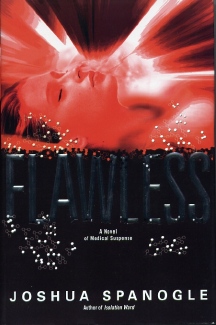 |
|
| Ooooh!
Raised foil letters! The latest in 1980's printing technology! |
Josh Spanogle's debut novel last year, 'Isolation
Ward', was an enjoyable
medical thriller that played just enough with the conventions of this
often hidebound subgenre to keep things light and interesting. I
spoke with Spanogle and found him to be every bit as interesting as his novel, and was
looking forward to the follow-up. Of course, you never know.
'Isolation Ward' was launched as a hardcover original, something rather
unusual in today's publishing climate where even veteran writers find
themselves between soft covers. It's a soft market out there, and if
there's any hesitation
on the part of readers, then the publishers have no hesitation when
it comes to switching from hardcover first editions to mass market
paperback
originals. Or nothing whatsoever.
All this just goes to say that Spanogle must have been doing something
very right. Not only is he back in a timely manner, he's back with
another hardcover original, 'Flawless' (Delacorte / Bantam Dell / Random
House
; September 4, 2007 ; $23), featuring the adventures of Dr. Nate McCormick.
I really liked this character, mostly because he was in general a rather
unlikable fellow. But pair him up with his girlfriend Brooke and you
get a sort of Nick and Nora deal happening.
It's still happening at the outset of 'Flawless', and as usual Nate starts
the novel out in trouble which is likely to get much worse. Sleeping on
the couch after a fight with Brooke is the easy part. Things get tough
when he gets a call from an old friend now in the biotech biz. And tougher
when someone dies, violently, brutally murdered.
Spanogle sticks with what worked in his previous novel and it works
here as well. On the down-home prose side, you have a novel written
in super-short
chapters that read like lightning. You have the damaged protagonist,
who has incurred much of the damage due to his own intractable nature.
His
not-so damaged other half. On the read-it-and-find-the-day-erased level,
Spanogle knows how to use character to drive action and action to drive
the reader through pages without the reader really being aware of it.
You look up and you're halfway through the novel.
But Spanogle also has a should-be-patented method of integrating a
big-ol' ethical question in his novels. 'Flawless', not surprisingly,
given the
cover art and the title, addresses the joys of cosmetic surgery, because
you know, at a time when MOST OF THE NATION CAN'T AFFORD HEALTH CARE,
IT'S REALLY IMPORTANT THAT THE WEALTHY LOOK GOOD*.
Flawless.
And there you have your burning anger, piss-me-right-off firecracker to
make Spanogle's latest toe-tapping page-turner just a little bit stickier
than one might expect. And of course, you can rest assured that Nate will
not handle matters as best he could. But that only makes Spanogle's didactic
interests more compelling and certainly more entertaining. It's always
better when the fellow who actually has his head screwed on straightest
is sort of a shit. The problem with novels that address ethical dilemmas
is that the characters are actually ethical, which in general, is not the
case in reality. People are complicated and conflicted. Spanogle uses this
to make his ethical concerns and his narrative more compelling. It's pretty
damn interesting that in a novel titled 'Flawless', it's the characters'
flaws that make the book worth your valuable time.
*Yes, I know there are lots of good reasons for cosmetic surgery. But
this novel ain't about that!
|
| |
|
08-14-07: Get a Deep Fix of Michael Moorcock
|
'The Metatemporal Detective'
|
|
Those
Lancer books were primal influences on many readers.
|
It's funny how a brand-spankin'
not even been published yet new book can bring the memories flooding
back in. Lou Anders over at Pyr sent me a
copy of 'The Metatemporal Detective' (Pyr / Prometheus Books ; October
2007 ; $25) by Michael Moorcock. Like may readers
who enjoy science fiction, I cut my teeth on Moorcock's books back
in my teenaged years.
I devoured all the Elric of Melniboné novels and then explored
the vasty reaches of his Multiverse, a concept that has now made
its way from science fiction to science fact via quantum physics.
If you're
an adolescent boy (or have the shattered remains of one still lodged
in your psyche), there can be few better reading experiences. You
get your albino, wimpy anti-hero, whose sword, Stormbringer is sentient
and
hungry for the souls of those it kills. You get lots of weird critters
and evils more evil than the anti-hero. It's the "just-one-taste-of-heroin" equivalent
for the young male science fiction reader.
Thus is Moorcock always going to evoke sentimental feelings, at least
in this reader. However, it's not those memories that were dislodged
as I
paged through 'The Metatemporal Detective'. Oh, no, it was another adolescent
obsession that unhinged me. So what goes well with Elric of Melniboné?
Hawkwind, that's what. For those who don’t know them, Hawkwind was
a sort of Black Sabbath-style hard rock band that added primitive electronic
processing and synthesizers to the loud guitars and basses, and took some
lyrics and themes from Moorcock himself. I'll confess to having a lot of
Hawkwind records; yes, records.
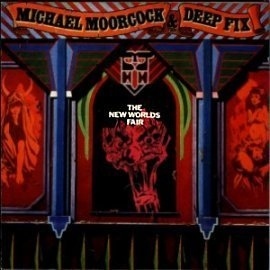 |
|
| It
still sounds pretty fresh for 1970's concept album. |
But it's not Hawkwind I'm taken back to either. Still, back in the late
seventies and early eighties, it was a lot of their music I'd listen to.
And I'd investigate side bands they were associated with. I still remember
the day I found New World's Fair by Michael Moorcock's Deep Fix. This was
a concept album written and largely sang by Moorcock with lots of help
from Hawkwind's members. I *think* I still have it somewhere. And I know
I have a chunk of it here in 'The Metatemporal Detective'. I can even get
the 1995 CD release.
'The Metatemporal Detective', the new Moorcock title from Pyr, collects
eleven Seaton Begg stories ranging from "The Pleasure Garden of Felipe
Sagittarius", originally published in 1966 in 'The Deep Fix' under
the pseudonym James Colvin to "The Flaneur of the Arcades of d'Opera" which
debuts in this collection. Seaton Begg is a detective employed by the
British Home Office to roam through time and alternate universes to
keep Bad Things
at bay; primary among those bad things is Zenith the Albino, a black
sword-wielding aristocrat who is also known as Elric.
|
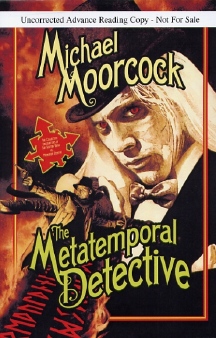
|
Seaton
Begg gets his own gig.
|
Presumably it should
not be surprising that nostalgia devours its own tail, but still, presented
with the memories, the reading, the music,
the confluence
of Moorcock, Pyr and Hawkwind ... It's easy to get sucked back into
Moorcock's entertainingly dense and historically rich style. What's
particularly nice
here is the way that Moorcock manages to pay tribute to the mystery
writers who inspired him while writing some very peculiar bits of very
weird fiction.
It's possible that you think you've never heard of or read Moorcock;
if that's the case, then this is not a bad place to start. You'll get
the
wildly baroque and the densely literary and the multi-genre spin in
one package. But trust me, even if the you who is reading this now
has indeed
never read Moorcock, you can count on the fact that there is another
version of you sporting about the Moorcockian Multiverse that has indeed
read the
author of "Behold The Man", one of those iconic stories of the
SF genre. You'd just best hope that the you which has read Moorcock doesn't
come gunning for the you that has not. That you, the one who is wondering
whether 'The Metatemporal Detective' is worth your valuable time, is at
a serious disadvantage. Look over your shoulder. Slowly. If nobody's there,
it's not too late to start reading Michael Moorcock. Even if you’re
not / no longer an adolescent male. Anything can be turned to your advantage.
|
| |
| |
|
08-13-07: A 2007
Interview With William Gibson ; NPR Report Scott Rosenberg
|
"Writing a novel like this is like inviting the zeitgeist in for tea."
Last Thursday, I had the opportunity to speak with William Gibson about,
well – a lot of things. I'd first met Gibson over twenty years
ago, when he was in Santa Monica signing copies of his then-new hardcover
first edition of 'Neuromancer' from Phantasia Press. I'd read the paperback
original and given more than one copy away. At the time, those Phantasia
Press hardcovers seemed really pricey, but this was the one I bought.
While Gibson was apparently able to peer into the future, I certainly
never would have guessed that I'd be speaking to him at KQED in a future
nobody could have foreseen.
We talked about that very fact in our conversation. He told me that had
someone tried to pitch a science fiction novel in which the world being
decimated by a disease that causes the immune system to self-destruct
while we slowly cook ourselves with car exhaust, and, and, and, and – well
such a person would have been shown the door rather quickly, or, more
likely, had security called to remove them. We talked about The Fortean
Times ("I've always considered myself a Fortean") and that
original Austin panel where "cyberpunk" was invented ("I
think I was drunk–or wanted to be drunk.") And, and, and –
I had Gibson read from both 'Neuromancer' and his evocative new novel,
'Spook Country'. I fire off the interview with an excerpt from the 'Neuromancer'
reading, but decided to added the full versions of both readings as an
appendix to both the MP3 and
the RealAudio files
I've uploaded to the podcast. When the interview ends, hang around and
you can hear the full readings;
they're well worth your valuable time.
I really enjoyed 'Spook
Country', and while I'll be posting a full review
shortly, let me tell you at the outset that it's rather different from
his other work. Gibson's got a very dry but very enjoyable sense of humor
and it's fully on display in 'Spook
Country'. His sense of place is impeccable.
I particularly enjoyed his description of a windstorm in Los Angeles.
I spent many years in the LA basin, and those sorts of storms always
have a surreal, supernatural aura about them. They always made me feel
as if I was no longer in the real world, but instead, on a movie set.
There are giant fans blowing the leaves and detritus just off screen,
just
out of your ken. Something is directing the world, and you can sense
it but you can never see it.
|
Debut Book Explores History of Software
Readers will recall my interview with Scott
Rosenberg and my review of 'Dreaming
in Code'. All this was working towards a project I have for NPR, which involves
talking to authors who have published their first books.
My
report for NPR on Jon Clinch was the first of these, and now I've followed it up with a
new report on Scott Rosenberg. These reports are mercifully short, to-the-point
and edited with a supreme skill by my editor over at NPR. I'm hoping readers
will be willing to give the NPR RealAudio a listen until I can get a WAV
file sometime next week, and especially hoping that they'll use
the Email This Story button on the page. If you're here for William Gibson, chances
are you're going to find Rosenberg fascinating as well. And if you're wondering
what it takes to get your first book published, try obsession. That seems
to serve and have served a vast number of authors just fine.
|
| |
|
|



